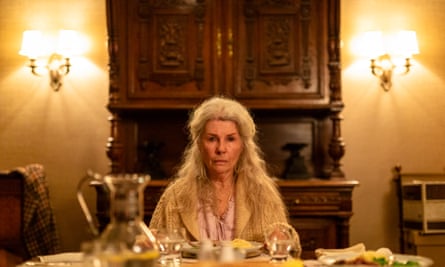“It’s not her anymore.”
This line alone perfectly sums up the duality in Natalie Erika James’ debut feature Relic, where supernatural possession meets the real-life horror of losing a parent to dementia. Returning to their old family home to locate their missing mother/grandmother, Kay (Emily Mortimer) and daughter Sam (Bella Heathcote) find a house plagued by black mould and Edna (Robyn Nevin) nowhere to be seen. When Edna eventually does return with no memory of the past few days, it’s clear that things are not as they seem.
Everything surrounding Edna is a relic, from her rotting house to the tennis net in the garden; her whole environment, where the rain never stops, is steeped in death and decay. Perhaps this is because the house is Edna in a sense: her many locked doors and fear of “it” getting in represents her inner mental battle against dementia. The black mould spreads like a virus through the house as the illness ravages her mind and the maze of never-ending hallways suggest that Kay and Sam are trapped in there as well.
But is Edna the source of the supernatural occurrences, with the black mould growing over her body and originating from her heart? In an emotional subversion of horror convention, it’s not that simple; Edna is not merely a supernatural presence, but a woman consumed by an awful disease. She tells Kay she wants to be buried to escape “it”, in a morbid death wish. It’s a not-so-subtle allegory for dementia, but one devastatingly grounded in reality.

This emotional weight differentiates Relic from other horror flicks, where the resolution, whilst at first gory and action-oriented, highlights the strength of familial love. With the help of a loving message, what’s left of Edna stops her onslaught and calmly reconciles with Kay. Where Kay was absent in the worsening of Edna’s condition, she now lovingly holds her mother’s corpse-like, demonic body in bed.
Strong performances from Mortimer, Niven and Heathcote really sell this family dynamic, with the love between the three just as evident as the tension. However, the portrayal of inter-generational familial relationships is far from warm and comforting, as both the past and future are painted in shades of grey. The chilling final shot suggests that what has happened before will happen again, and, to namecheck another family-centric horror, that this fate is hereditary.
The Verdict
Relic isn’t the most original horror in recent memory and doesn’t quite compete with the genre-defying subversions of Jordan Peele, but the way James creates an atmosphere of dread and decay out of the real-life terror of dementia is to be highly commended. Despite the well-crafted horror aspects of the film, it is the emotional backbone of Relic that is the feature’s greatest triumph, resulting in a great debut effort from Natalie Erika James.
Rating: 7/10
Words by James Nash
Other reviews from the London Film Festival can be found here.
